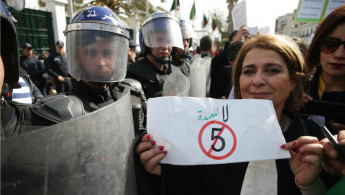Algerians defy demand from Bouteflika not to protest on International Women's Day
Algerian President Abdelaziz Bouteflika has called for women not to participate in protests against his bid for a fifth term as president of Algeria on Friday, which coincide with International Women's Day.
On Friday, women were among the thousands of protesters who gathered in the capital Algiers to mark the occasion - which is also the third Friday of protests against Bouteflika.
"We appeal to mothers - first and foremost - to ensure the protection of the homeland in general and, most of all, its sons, and to the nurturers of the nation in general and its children in the first place, and to maintain stability in devotion to the authority and a people to build," said the president in a letter published on Thursday.
Bouteflika also used the letter to warn against Algeria experiencing an "Arab Spring" of its own, in which the people could be manipulated by foreign groups and other trouble-makers, and the country could devolve into "chaos".
Such unrest could return Algeria to the "national tragedy" of the country's decade-long civil war in the 1990s.
Algerian women activists on Thursday also called for a special day of protest on Friday in celebration of International Women's Day.
|
|
Some women on social media called for women to wear the traditional white haik, a garment similar to a niqab. Others suggested wearing black to protest the "sad" situation in Algeria.
Calls also spread widely on social media under the hashtag "#March 8 Movement" for large but peaceful demonstrations in cities across the country.
"I will not throw a single stone!" and "No windows will be smashed", were among "18 commandments" sent out to protesters by poet and writer Lazhari Labter, as well as instructions to clean up streets after the protests.
He also called for demonstrators to turn the event into "a day of celebration" and one of "love, faith, Algerian flags and roses".
Volunteers have signed up to marshall protest routes, provide first aid and to clean up, while drivers have offered to shuttle participants to venues from outside city centres.
|
|
Thousands of Algerians converged on the capital's landmark Grand Post Office Square on Friday, waving Algeria's green, white and red flag and chanting, AFP reported.
The security presence was tight, with anti-riot vehicles out in force, alongside a water cannon, as a police helicopter hovered overhead, although the past two weeks of demonstrations have been peaceful.
Authorities also halted train and metro services in the capital, Reuters reported.
Despite those measures, protests have been growing in size. The number of protesters out on the streets on Friday will likely increase as the day goes on.
A taxi driver who did not wish to be named told AFP that on February 22, the first Friday protests against Bouteflika, less than half the residents of his district of Algiers had turned out.
"On March 1, about two out of three said they would march, and [now] 100 percent of people are saying they will be out on the streets," he said.
Bouteflika, who uses a wheelchair and has rarely been seen in public since suffering a stroke in 2013, announced on 10 February that he will run for another term in office in the 18 April presidential election.
He is Algeria's longest-serving president and a veteran of its independence struggle who has clung to power since 1999 despite his ill health.
Agencies contributed to this report.
Follow us on Twitter: @the_newarab





 Follow the Middle East's top stories in English at The New Arab on Google News
Follow the Middle East's top stories in English at The New Arab on Google News
![The UAE is widely suspected of arming the RSF militia [Getty]](/sites/default/files/styles/image_330x185/public/2024-11/GettyImages-472529908.jpg?h=69f2b9d0&itok=Yauw3YTG)
![Netanyahu furiously denounced the ICC [Getty]](/sites/default/files/styles/image_330x185/public/2024-11/GettyImages-2169352575.jpg?h=199d8c1f&itok=-vRiruf5)
![Both Hamas and the Palestinian Authority welcomed the ICC arrest warrants [Getty]](/sites/default/files/styles/image_330x185/public/2024-11/GettyImages-2178351173.jpg?h=199d8c1f&itok=TV858iVg)